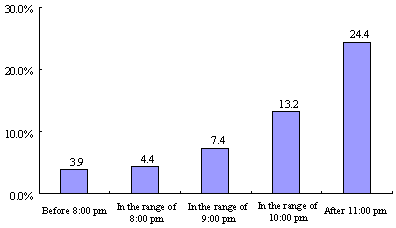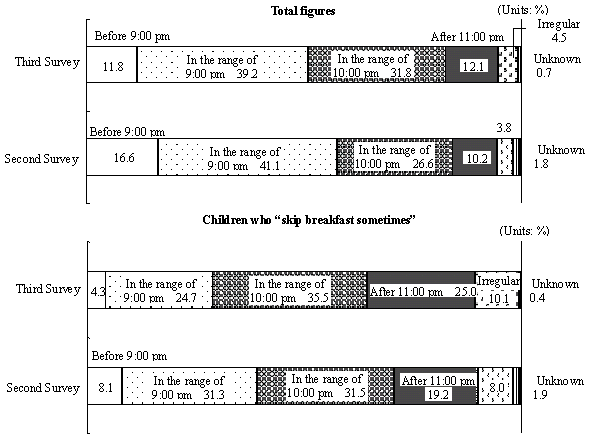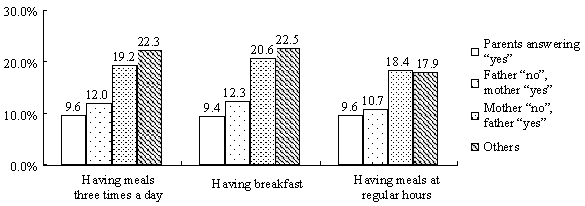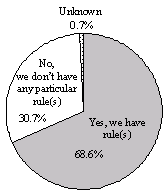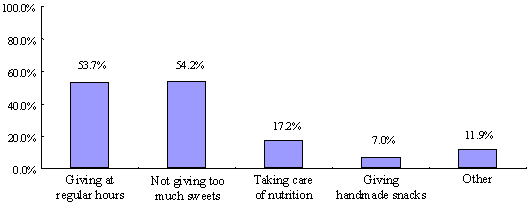| |
Total |
Concerned |
Not concerned in particular |
| |
Eats very little |
Eats too much or very little at times |
Has many likes and dislikes |
Does not bite well |
Does not sit still when eating |
Skips breakfast sometimes |
Other |
| Total |
100.0 |
79.9 |
11.3 |
44.5 |
25.0 |
18.4 |
47.6 |
11.8 |
6.0 |
19.4 |
| Mother only |
100.0 |
79.2 |
12.5 |
43.5 |
25.6 |
18.1 |
45.8 |
10.7 |
5.8 |
20.0 |
| Parents only |
100.0 |
80.6 |
12.2 |
44.5 |
27.7 |
19.2 |
46.2 |
10.2 |
6.3 |
18.7 |
| Mother and grandparents, etc. |
100.0 |
82.6 |
13.2 |
48.3 |
25.3 |
18.8 |
53.6 |
13.1 |
6.8 |
16.6 |
| Parents and grandparents, etc. |
100.0 |
83.5 |
12.6 |
50.5 |
26.4 |
19.3 |
53.7 |
13.7 |
6.5 |
16.0 |
| Mother and nursery school teachers, etc. |
100.0 |
78.2 |
8.4 |
43.2 |
23.2 |
17.9 |
45.5 |
13.6 |
5.2 |
21.0 |
| Parents and nursery school teachers, etc. |
100.0 |
78.7 |
8.0 |
40.9 |
22.4 |
18.9 |
47.1 |
12.6 |
6.3 |
21.0 |
| Mother, grandparents, nursery school teachers, etc. |
100.0 |
78.7 |
8.8 |
43.0 |
21.6 |
17.4 |
49.0 |
13.6 |
6.4 |
19.9 |
| Parents, grandparents, and nursery school teachers, etc. |
100.0 |
78.4 |
7.7 |
43.4 |
21.5 |
18.0 |
50.0 |
13.4 |
6.4 |
20.8 |
| Grandparents and others only; or grandparents and nursery school teachers,
etc. |
100.0 |
77.4 |
11.6 |
44.5 |
19.3 |
16.6 |
50.6 |
11.9 |
5.4 |
22.2 |
| Other combinations |
100.0 |
75.8 |
8.0 |
41.9 |
19.5 |
16.7 |
43.1 |
14.5 |
4.3 |
23.1 |
| Employment status of mother |
|
| Unemployed |
100.0 |
80.7 |
12.5 |
44.8 |
26.7 |
19.0 |
47.9 |
11.3 |
6.2 |
18.6 |
| Employed |
100.0 |
78.3 |
9.2 |
43.9 |
22.0 |
17.5 |
47.1 |
12.7 |
5.8 |
20.9 |
